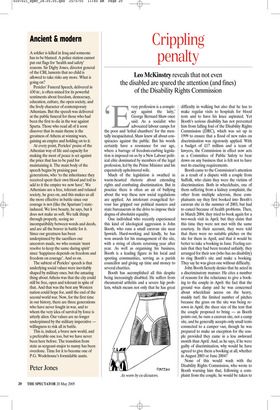Ancient & modern
A soldier is killed in Iraq and someone has to be blamed. A police station cannot put out flags for ‘health and safety’ reasons. Sir Digby Jones, director general of the CBI, laments that no child is allowed to take risks any more. What is going on?
Pericles’ Funeral Speech, delivered in 430 BC, is often mined for its powerful sentiments about freedom, democracy, education, culture, the open society, and the lively character of contemporary Athenians. But the speech was delivered at the public funeral for those who had been the first to die in the war against Sparta. Those who read all of it soon discover that its main theme is the greatness of Athens at winning wars, gaining an empire and holding on to it.
At every point, Pericles’ praise of the Athenian way of life and capacity for making the most of peace is set against the price that has to be paid for maintaining it. The main body of the speech begins by praising past generations, who ‘to the inheritance they received spent their own blood and toil to add to it the empire we now have’. We Athenians are a free, tolerant and relaxed society, he goes on, and this makes us all the more effective in battle since our courage is not (like the Spartans’) stateinduced. We love beauty, he says, but it does not make us soft. We talk things through properly, seeing no incompatibility between words and deeds, and are all the braver in battle for it. Since our greatness has been underpinned by the sacrifices our ancestors made, we who remain ‘must resolve to keep the same daring spirit’ since ‘happiness depends on freedom and freedom on courage’. And so on.
The subtext of Pericles’ speech is that underlying social values were inevitably shaped by military ones, but the amazing thing about Athens was that the city could still be free, open and tolerant in spite of that. And that was the best any Western nation could hope for, until the end of the second world war. Now, for the first time in our history, there are three generations who have never fought in war, and to whom the very idea of survival by force is utterly alien. Our values are no longer underpinned by the military imperative willingness to risk all in battle.
This is, indeed, a brave new world, and a preferable one too, but we have never been here before. The transition from state as sergeant-major to nanny has been overdone. Time for it to become one of P.G. Wodehouse’s formidable aunts.
Peter Jones






















































 Previous page
Previous page